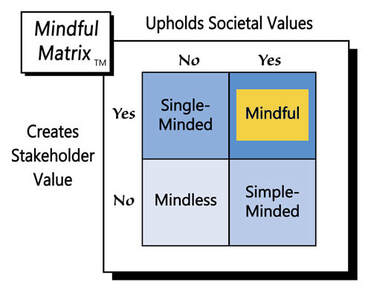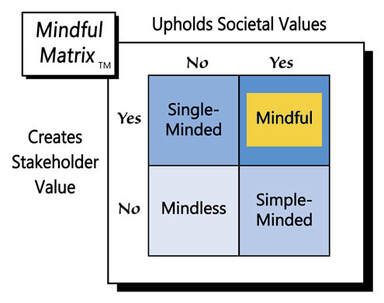On August 19, 2019, 181 CEOs of the Business Roundtable, a Washington D.C.-based nonprofit comprised of “chief executive officers of America’s leading companies,” issued a Statement on the Purpose of a Corporation.
That news may not sound startling, but what is surprising is the new Statement’s focus on serving “all Americans”—an abrupt departure from what most people associate with business: making money for shareholders. The new Roundtable Statement, in contrast, details the executives’ commitment to serving the needs of all corporate stakeholders by doing things like:
- Delivering value to customers
- Investing in employees
- Dealing fairly and ethically with suppliers
- Supporting communities
The men and women who endorsed the new Statement aren’t just any execs. They’re the heads of many of the world’s largest and most successful corporations, for instance:
- Jeff Bezos, Founder and Chief Executive Officer of Amazon
- Tim Cook, CEO of Apple
- Brian Moynihan, Chairman of the Board and CEO of Bank of America
- James Hackett, President and CEO of Ford Motor Company
- David Solomon, Chairman and CEO of The Goldman Sachs Group
- Marilyn Hewson, Chair, President, and CEO of Lockheed Martin
- Lisa Davis, CEO of Siemens Corporation USA
- Doug McMillon, President and CEO of Walmart, Inc.
Several signatories supplemented the statement with their personal thoughts, for instance, Jamie Dimon, CEO of JPMorgan Chase & Co. and Chair of the Business Roundtable said:
“Major employers are investing in their workers and communities because they know it is the only way to be successful over the long term. These modernized principles reflect the business community’s unwavering commitment to continue to push for an economy that serves all Americans.”
Similarly, Alex Gorsky, CEO and Chair of Johnson & Johnson added:
“This new statement better reflects the way corporations can and should operate today.” “It affirms the essential role corporations can play in improving our society when CEOs are truly committed to meeting the needs of all stakeholders.”
Those are nice sentiments. Unfortunately, though, they fly in the face of what many have accused business of doing for decades if not millennia—profiting at any cost. Moreover, some champions of capitalism have openly embraced that calloused approach to commerce, perhaps none more famously than economist Milton Friedman. In a September 13, 1970 New York Times article, among other places, Friedman argued that business’s only social responsibility was to increase profit, i.e., to maximize shareholders’ return on investment.
Beyond Friedman’s free markets manifesto, public cynicism about business has gained momentum thanks to a seemingly never-ending series of moral lapses and money grabs by certain businesspeople and companies such as Bernie Madoff, Enron, Arthur Andersen, Bear Stearns, Martha Stewart, Barclays, WorldCom, and Volkswagen.
It’s no surprise, therefore, that some are very critical of the new Business Roundtable Statement. One such cynic is business columnist David Lazarus, who in a recent Los Angeles Times article maintained that the edict is nothing more than “corporate propaganda” put forth by conscience-stricken executives trying to save face amid growing business backlash. Furthermore, Lazarus argues that the statement is conspicuously light on specifics, such as how exactly the companies purport to make all stakeholders their priority or what they might do to address the gross asymmetry in executive pay.
Lazarus is not the only one skeptical of the Roundtable Statement. For his article, he interviewed several others who share his beliefs, including Kenneth Osgood, a history professor at Colorado School of Mines, who said “It seems pretty obvious that CEOs are trying to head off growing public pressure on a number of fronts, including how much they’re paid and taxing the rich.”
Echoing those sentiment was professor of public diplomacy at USC, Nicholas Cull, who said “There seems to be a concern among the CEOs that they’re becoming the bad guys.” “This suggests that the business community is expecting blowback from their policies, and they’re trying to get ahead of it.” Similarly, University of Alabama history professor Margaret Peacock simply called the Roundtable Statement “a clear and pretty heavy-handed attempt to obscure reality.”
Time will tell whether such strong criticism is deserved or if, instead, the signatories’ companies will live up to the commitments. In the meantime, Lazarus and others critical of the Roundtable Statement should consider two key points about business:
1) Business benefits society. Yes, certain businesspeople and companies have made mistakes, but that harm is far outweighed by the positive economic and social impact business has had and continues to have on local communities, nations, and the world.
So many people, including Lazarus, owe their livelihoods to businesses, so many consumers enjoy the products/services firms offer, and so many governments benefit from the tax revenue companies provide.
2) Responsible business strategies and tactics stem from a proper philosophy of business. Just like we wouldn’t expect someone who has a distorted view of relationships to treat others decently, we shouldn't expect businesses to consistently treat stakeholders with respect unless they first make it their mission to do so.
The Business Roundtable Statement isn’t intended to be an A to Z blueprint for how exactly to increase employee compensation or build communities, but what it does propose is a very important prerequisite: an overarching goal that can serve as a guide for all other business activities, including marketing.
No businessperson is perfect, but when they hold each other accountable for positive impact, they’re often able to bring about good that they couldn’t achieve individually. That’s the promise and potential of the Business Roundtable’s new ‘purpose statement,’ which also makes the edict “Mindful Marketing.”
Learn more about the Mindful Matrix and Mindful Meter.
Check out Mindful Marketing Ads and Vote your Mind!







 RSS Feed
RSS Feed